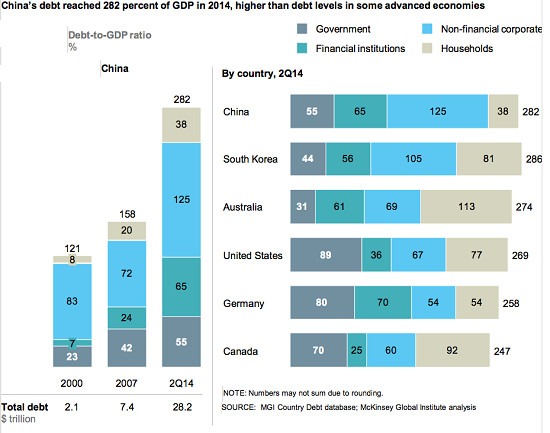The Global Test Most Will Fail: Surviving the Bust That Inevitably Follows a Boom
November 2, 2015
Now that virtually every nation is entering the bust phase, all are being tested.
Booms powered by credit, new markets and speculation are followed by busts as night follows day. This creates a very difficult test for every nation-state facing the inevitable bust: how does the leadership deal with the end of the boom?
As the world is about to learn once again, the "fix" may make the next bust even more destructive.
let's start by reviewing what conditions generate booms.
1. An undeveloped nation gains access to new credit, markets and resources and go through a "boost phase" much like a rocket lifting off when suddenly abundant finance capital ignites the country's latent growth potential. When a country with little to no public or private debt suddenly gains access to essentially unlimited capital, growth explodes.
One variant of this is the discovery of vast new resources that quickly attract capital (for example, oil) or that generate new wealth (for example, gold).
The modern example of a developing nation gaining access to new credit, markets and resources is of course China, but this model also describes America in the 1790s and early 1800s, and many other nations in various phases of their development.
2. A new sector opens up in a developed nation's economy. A recent example is the Internet, which exploded in a boost phase from 1995 to 2000. In these cases, the new sector simply didn't exist, and the boost phase is as spectacular as the ones in newly developing economies.
Example from American history include the railroad-fueled boom of the 1870s and 1880s and the advent of electric light and later, radio.
3. A previously "safe" sector is financialized as the assets are collateralized into vast mountains of debt and leverage, both of which fuel runaway speculation.
The mortgage-backed-securities and subprime-fueled housing boom of 2002-2008 is a recent example of this: a safe, conservative sector (mortgages and housing) was rapidly financialized into a speculative frenzy.
Eventually this boost phase burns thru all the productive investments and moves into mal-investment, rampant speculation and outright fraud as insiders take advantage of new entrants. In the U.S., this occurred in the early 1890s once the construction of railroads had moved to the over-indebted, speculative mal-investment phase.
The same post-boost phase bust occurred in 2000 after the dot-com frenzy had run its course.
The difference between the three booms is that busts that are limited to one sector are easier to manage than busts in the entire economy. The problem with the subprime housing bust was that it wasn't limited to housing or mortgages--the speculative boost phase had infected the entire financial system.
When entire economies enter the bust phase, the nation's political, social and economic foundations are tested. If they aren't rock-solid, the country enters a crisis that is often marked by war, economic collapse and political destabilization.
The political and financial leadership that won plaudits during the boost phase for wise management is loathe to accept the bust phase as necessary medicine for over-indebtedness, speculation and mal-investment. Instead, the leadership attempts a series of hastily assembled financialization "fixes" aimed at returning the economy to the boost phase of rapid growth: fiscal and monetary stimulus, lowering interest rates, etc.
These have the same effect as tossing gasoline on a fire. Debt, leverage and speculation are ignited, but since the productive investments have long been made, all that's left is unproductive mal-investment and speculative bets.
Exhibit A is the global economy's soaring debt, with China's vast expansion since 2007 as the prime example of "fixing" Degrowth with vast mountains of new debt that flow mostly into speculative wormholes and mal-investments such as empty malls, airports, sports facilities and cities.

Now that virtually every nation is entering the bust phase, all are being tested. So far, virtually all are in denial and still trying to 'solve" the Degrowth/speculative bust reality with the same old financialization tools.
That these will fail is as predictable as night following day.
NOTE: Contributions/subscriptions are acknowledged in the order received. Your name and email remain confidential and will not be given to any other individual, company or agency.
|
Thank you, Gerald L. ($52), for your stupendously generous contribution to this site -- I am greatly honored by your support and readership. |
Thank you, William P. ($100), for your outrageously generous contribution to this site -- I am greatly honored by your support and readership. |

Discover why Iím looking to retire in a SE Asia luxury resort for $1,200/month.